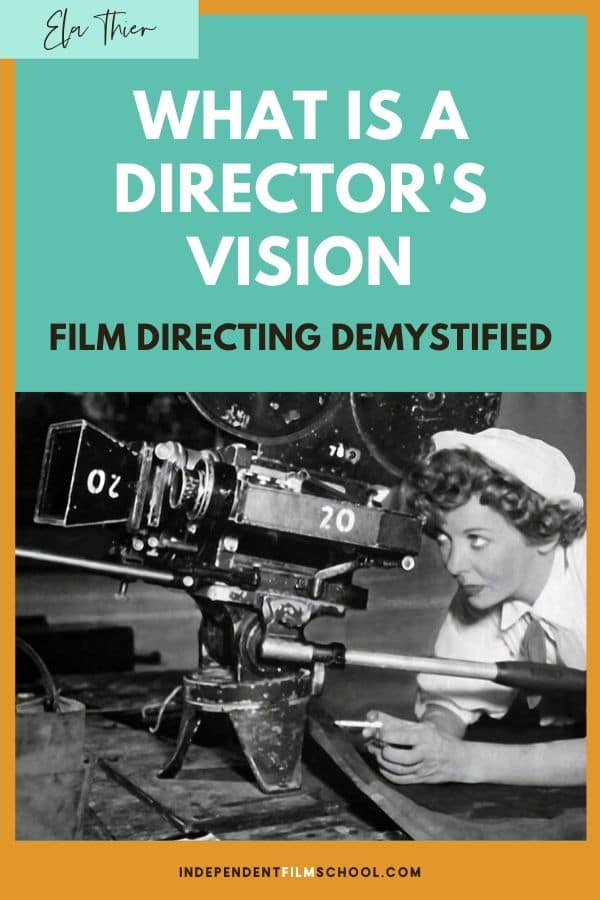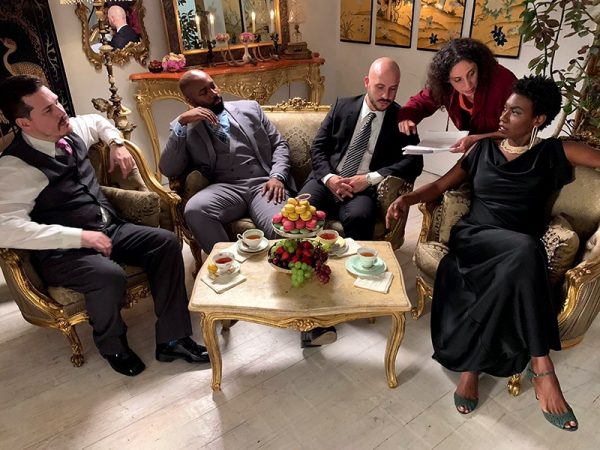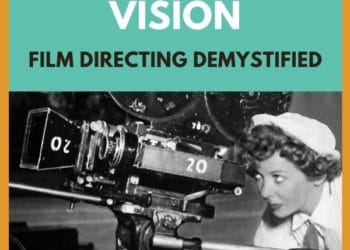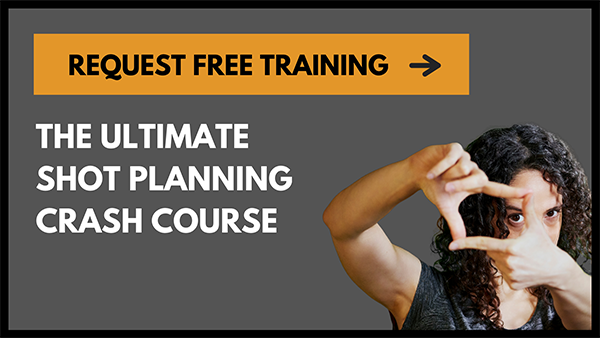
film directing works when you have a vision
I don’t usually produce films I don’t direct (would love to, but time…) I couldn’t resist, however, producing Jamie Canobbio’s film, The Brothers Molina.
The reason it was so enjoyable, and the reason everyone else enjoyed working on his film as well, was the fact that Jamie had a clear vision. When a director’s vision of a film is clear, people enjoy working in the service of their vision.
I’ve received that compliment myself on projects I’ve directed (go me!) so let’s talk about what makes me and Jamie, and you, if I had to guess – so damn smart.
what exactly is a “director’s vision”?
This term gets thrown around a lot and sound like something really important that we’re supposed to understand. We all nod and smile at these often pretentious conversations about “a director’s vision.” We assume that such visions must be a sign of somebody being real smart.
Pfff 🙄
A film director’s vision is someone seeing a movie in their head. That’s all.
Almost all of us have had some movie, or scenes, play out in our heads, that we think would be really cool. That movie that you see in your head – that’s your director’s vision.
If any part of a movie that hasn’t been made yet has ever played out in your head, You are a film director and you have a vision.
It doesn’t take special talent or some inherent and mysterious ability that certain magical people are born with. Well… let me rephrase that… Every one of us is that magical person who was born with the inherent ability to see a movie in our heads that we haven’t yet seen – that no one has seen.
Having a vision as a film director is A matter of habit.
Like anything else in life: the more you do it, the more you do it. The more you get used to walking around seeing movies in your head that haven’t yet been made, the more often those visions will come to you.
What can help a film director induce a vision?
For me: Walks. Showers. Journaling. Hanging with friends who I can laugh really hard with. And of course: some piece of crazy addictive music that I want to listen to on a loop – that will totally make me see movies in my heads.
The other thing that will induce a vision is other people’s vision. Watching films that inspire help me envision my films.
I once had a screenwriting teacher tell me to think of the movies I love best and go write them. It was great advice and one I’d recommend for film directors too. Think of movies or shows you love and go make those movies.
Comment below to share with me:
❓What movies or shows inspire you to direct ❓
Or:
❓What do you do to induce a vision❓
Before we go on, quick word from the sponsors – that’s me 😝
I offer my members a courtesy training on film directing, along with many other resources for screenwriters and filmmakers. Click below to learn more.
FILM DIRECTING: THE JOB OF turnING a vision into a movie.
Like anything else in life: the vision is the easy part. Its execution is the hard part. That’s the part that takes some chops and practice. Let me go over the recipe:
A great film director is a great communicator.
You and your producer (which is probably you too, and hopefully another friend or two), will work together to assemble the team that will make you look good 😝
Be sure to read this article if you plan to be both producer and director. It’ll help you avoid the pitfalls.
It’s not your job when directing a film to be a great art director, a great actor, or great DP (Director of Photography). Knowing where the on button is on the camera isn’t required either.
What you need is to work with the producer to assemble the cast and crew that will do those things beautifully.
BUT! Film directing is all about knowing how to communicate this vision. It’s also about knowing how to draw out the best in people and lead them to do their best work.
When directing a film, The more confident you are in your vision, the more collaborative you become.
I’ve been criticized – and lauded – for being quite the “auteur” filmmaker. An “auteur filmmaker” is someone who does it all: writes, directs, produces, edits, makes the coffee 🤪
Allow me to indulge in a quick show-off moment: Film critic, Chris Maynard, wrote in his review of my film, Tomorrow Ever After, that the film resurrected his belief in auteur filmmakers. Tee hee 🙂 Read review here. But I digress!
When a director is confident in their vision and willing to try stuff and make mistakes, then they also naturally become more eager and interested in hearing other people’s opinions.
A confident director is eager for ideas, seeks them, asks for them, enjoys hearing them, and then relaxedly uses the ones that truly serve and even elevate the vision, and tosses those that are inconsistent with their vision.
That’s all. When you know your vision, you can easily use-or-lose people’s ideas. It’s a yummi process.
THE KEY TO film directing, like everything else in life, is PRACTICE
Speaking of chops and practice and equating film directing with anything else in life: the more you do it, the better you get at it.
The way to become a good film director is by directing, probably poorly at first. No getting around that.
Daunted by the idea? Or convinced you don’t have the means? Check out my article on Creating the $4 Movie.

If you’re interested in film directing, you’re a director.
When it comes to film directing, people seem particularly wedded to this ridiculous idea that “some people have it” and some don’t. (Cue eye roll.)
film directing doesn’t require some magic talent. it requires practice.
Any one of us could become skilled through study and practice. Like any other artistic craft, like any craft at all for that matter, the more we do it, the better we get at it. Film directing is not different.
Developing our skill set and building our experience makes it easier (and faster) to create on the screen the vision that we see in our minds.
👉 Remember to comment below and let me know: What movies or shows have inspired your vision? What else do you do, or might you do, to help you see a movie in your mind that hasn’t been produced yet?
See you at the movies! Ela



At 75 my Dream is to produce this movie ideal in my mind , need all the help that i Can get, contact me please thanks
Hi, thank you so much for this article! The films that inspire me are early German expressionist films, and Ukrainian and Russian films for how natural they were, in some shots (!). As well as early Charlie Chaplin films. Then the work of Edgar Wright as well, “Hot Fuzz” especially for the editing. Oof, that was quite a lot! To inspire my vision, I often take time when sketching to have ideas pop up. Walks help as well, and music too – a way to allow my mind to go quiet and play. There’s also a character I created a while back, and she tends to create her own new stories. Thank you again! Cris